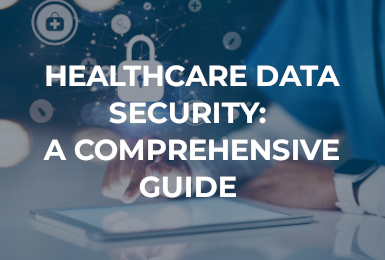For most people, choosing the right career means weighing a variety of different factors. You need to consider your own interests and skills, of course, but you also need to think about the bigger picture of industry landscapes and the job market - things like projected national job growth, earning potential, any specific training and/or education required, and availability of jobs in your area. If you're switching careers, or starting out on a new one, it's important to know that you'll have stability and longevity in your chosen path.
The healthcare administration field is one of the top choices for individuals seeking that kind of assurance. Why go into healthcare? There are many reasons - it's growing, it pays well, it's fulfilling, and it's a great way for those interested in the healthcare industry but who do not want to work in a medical capacity, making it an excellent option for those seeking new opportunities.
Is Healthcare Administration a Good Career Choice?
Healthcare administration is an excellent career choice for those seeking challenging, meaningful work in a growing field. As the U.S. population ages, and baby boomers remain increasingly active later in life, there is a growing need for medical facilities to care for these individuals - and with that comes an increased need for healthcare administrators.
Healthcare administration is one of the fastest-growing occupations in the nation, with high median salaries, and offers plenty of opportunity to those looking to grow professionally.
Are There Jobs in Healthcare Administration?
According to the Bureau of Labor Statistics, healthcare administration jobs are projected to grow 18% between 2018 and 2028, much faster than the average for all occupations, with 71,600 jobs being added in that time period.
This widespread growth means that healthcare administrators are in-demand nationwide, meaning you will likely be able to find opportunities in your area.
What Is the Salary for Healthcare Management Jobs?
Salaries in the healthcare administration field are high, with the a median annual salary of $99,730 in 2018. Pay in this industry will vary based on the type of organization you work for, with government agencies paying the most (a median annual salary of $110,460). The Bureau of Labor Statistics also notes a median annual salary of $108,730 in state, local, and private hospitals; $92,390 in outpatient care facilities; $90,920 in physician's offices; and $84,260 in nursing and residential care facilities.
Your salary will also depend on your level of experience. If you have prior management experience, or have worked in a medical setting for a long time, you can likely secure a higher starting salary.
Education also does play a big role; your earning potential is likely to increase with your degree level. When considering their options, many people ask, "what is an MHA degree salary?", trying to determine if a graduate degree in healthcare is worth the investment. While there are a number of factors that will influence the answer - from experience level to location to organization type - in general, you can expect a significant salary bump with a master's degree in healthcare administration.
Is Healthcare Administration a Good Degree?
Although you can often get hired in many healthcare organizations with an associate degree, if you're looking to increase your career potential, a bachelor's degree in healthcare administration is important. Many positions list a B.S. as a minimum hiring requirement, making an education in the field a worthy investment. A degree will give you deep knowledge in the field and help make you a well-rounded, valuable employee.
If you want to go even further in the field, you might want to consider a master's in healthcare administration, which will deepen your expertise and give you the tools you'll need to step into a management or leadership role. As mentioned above, an M.S. in healthcare administration will help you boost your earning potential, and will also open professional doors by making you eligible for a variety of specialized roles.
What Are the Education Requirements for Healthcare Administration?
To build a successful career in healthcare administration, earning a bachelor’s degree in healthcare administration or a related field is typically the first step. This foundational education provides essential knowledge in healthcare services, finance, policy, and leadership—key areas that health administrators need to navigate today’s evolving healthcare landscape.
A bachelor’s degree in healthcare administration equips students with expertise in healthcare systems, project management, information technology, and performance improvement. Those looking to advance their careers may consider a master’s degree in healthcare administration to deepen their expertise and qualify for higher-level leadership roles.
What Skills Are Required for a Healthcare Administration Career?
Successful healthcare managers need a combination of technical expertise and soft skills to oversee healthcare services effectively. A healthcare administration program will cover topics such as finance and accounting, healthcare laws and regulations, human resources, and organizational development. Beyond technical knowledge, employers seek health administrators who excel in:
- Leadership & Decision-Making: Managing teams and guiding strategic initiatives.
- Problem-Solving & Critical Thinking: Addressing challenges and improving patient care operations.
- Communication & Interpersonal Skills: Collaborating with medical staff, executives, and stakeholders.
- Project & Process Management: Enhancing healthcare workflows and efficiency.
What Healthcare Jobs Are in Demand?
Healthcare administration is a diverse field, with plenty of opportunities for individuals with all kinds of skillsets and interests. With a degree in healthcare administration, you can find work in roles such as:
- Administrative Medical Assistant
- Business Development Associate
- Financial Manager
- Healthcare Financial Consultant
- Hospital Administrator
- Human Resources Manager
- Information Technology Specialist
- Office Manager
- Program Reimbursement Specialist
And as you gain more experience and pursue further education and training, you can find higher-level roles such as:
- Chief Executive Officer
- Chief Operations Officer
- Clinic Manager
- Health Care Consultant
- Health Services Manager
- Hospital Administrator
- Nursing Director
- Program Manager
What Is it Like to Be a Healthcare Administrator?
Healthcare administration is a fulfilling career for those looking for a job that makes a difference. Although you may not be working with patients directly, you'll be playing a critical role in our healthcare system, and improving the lives of patients by helping to create the best experience possible.
You will often have the opportunity to work in close coordination with medical staff, leading to an enriching and educational work atmosphere. If you're someone who enjoys a dynamic environment with new challenges and opportunities arising daily, healthcare administration might be right for you!
So if you've considered these questions and are interested in taking the next step, consider diving deeper by researching employment opportunities in your area and taking a look at degree programs that might fit your needs. If you decide to pursue healthcare administration, a long and fulfilling career awaits you.
Take the Next Step Toward a Rewarding Career in Healthcare Administration
If you’re ready to make an impact in the healthcare industry, Champlain College Online’s bachelor’s in healthcare administration can equip you with the skills and knowledge to succeed. With a flexible online format designed for working professionals, you’ll gain expertise in healthcare systems, leadership, policy, and management, preparing you for a variety of career paths in this growing field.
Have questions? Contact our admissions team to learn more today!
Download Program Guide
Learn what you can expect from our online bachelor's in healthcare administration program.

Download Program Guide
I acknowledge that, by clicking the "submit" button, I am giving my express written consent to Champlain College and its representatives to contact me about educational opportunities via email, text, or phone, at the phone number above, including my mobile phone, using an automatic dialer, or pre-recorded message. Message and data rates may apply. I understand that my consent is not a requirement for enrollment, and I may withdraw my consent at any time.






